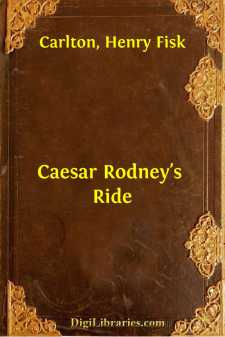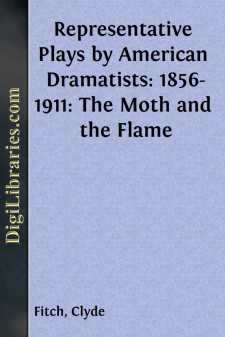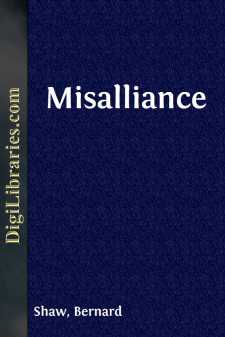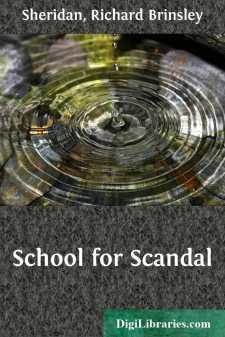Drama
General Books
Sort by:
On July 1, 1776, the Continental Congress of the American Colonies faced one of the most important crises this country has ever passed through. Upon what happened that night depended the fate of the resolution before Congress which declared that: "These United Colonies are, and of right ought to be, free and independent States, that they are absolved from all allegiance to the British Crown, and...
more...
by:
George Meredith
ON THE IDEA OF COMEDY AND OF THE USES OF THE COMIC SPIRIT Good Comedies are such rare productions, that notwithstanding the wealth of our literature in the Comic element, it would not occupy us long to run over the English list. If they are brought to the test I shall propose, very reputable Comedies will be found unworthy of their station, like the ladies of Arthur’s Court when they were reduced...
more...
by:
Clyde Fitch
CLYDE FITCH (1865-1909) Clyde Fitch brought a vivacity to the American stage that no other American playwright has thus far succeeded in emulating. The total impression of his work leads one to believe that he also brought to the American stage a style which was at the same time literary and distinctly his own. His personality was interesting and lovable, quickly responsive to a variety of human...
more...
by:
Hannah More
ACT THE FIRST. SCENE I. A GOTHIC HALL. Enter Edric and Birtha. Bir.What may this mean? Earl Douglas has enjoin'd theeTo meet him here in private?Edr.Yes, my sister,And this injunction I have oft receiv'd;But when he comes, big with some painful secret,He starts, looks wild, then drops ambiguous hints,Frowns, hesitates, turns pale, and says 'twas nothing;Then feigns to smile, and by his...
more...
DRAMATIS PERSONÆ. Duke of Milan, Father to Silvia.Valentine,the two Gentlemen.Proteus,Antonio, Father to Proteus. Thurio, a foolish rival to Valentine. Eglamour, Agent for Silvia in her escape. Host, where Julia lodges. Outlaws, with Valentine. Speed, a clownish Servant to Valentine. Launce, the like to Proteus. Panthino, Servant to Antonio. Julia, beloved of Proteus. Silvia, beloved of Valentine....
more...
by:
Bernard Shaw
MISALLIANCE Johnny Tarleton, an ordinary young business man of thirty or less, istaking his weekly Friday to Tuesday in the house of his father, JohnTarleton, who has made a great deal of money out of Tarleton'sUnderwear. The house is in Surrey, on the slope of Hindhead; andJohnny, reclining, novel in hand, in a swinging chair with a littleawning above it, is enshrined in a spacious half...
more...
by:
Oliver Huckel
PARSIFAL. PART I THE COMING OF PARSIFAL Within a noble stretch of mountain woods,Primeval forest, deep and dark and grand,There rose a glorious castle towering high,—And at its foot a smiling, shimmering lakeLay in the still lap of a verdant glade.'T was daybreak, and the arrows of the dawnWere shot in golden glory through the trees,And from the castle came a trumpet blastTo waken life in all...
more...
SCENE I.—The Library Enter SURFACE and SERVANT SURFACE. Mr. Stanley! and why should you think I would see him?— you must know he came to ask something! SERVANT. Sir—I shouldn't have let him in but that Mr. Rowley came to the Door with him. SURFACE. Pshaw!—Blockhead to suppose that I should now be in a Temper to receive visits from poor Relations!—well why don't you show the Fellow...
more...
THERE ARE CRIMES AND CRIMES INTRODUCTION Strindberg was fifty years old when he wrote "There Are Crimes and Crimes." In the same year, 1899, he produced three of his finest historical dramas: "The Saga of the Folkungs," "Gustavus Vasa," and "Eric XIV." Just before, he had finished "Advent," which he described as "A Mystery," and which was published...
more...
ACT ONE SCENE: A Room in the Church Tower. Window shutters at back wide open, starlit sky is seen through windows. Background: Snow covered house-roofs; gable windows in the distance brilliantly illuminated. In room an old chair, a fire-pan and a picture of the Virgin, with a lighted candle before it. Room is divided by posts—two in centre thick enough to conceal an adult. Chant, in unison, from the...
more...











